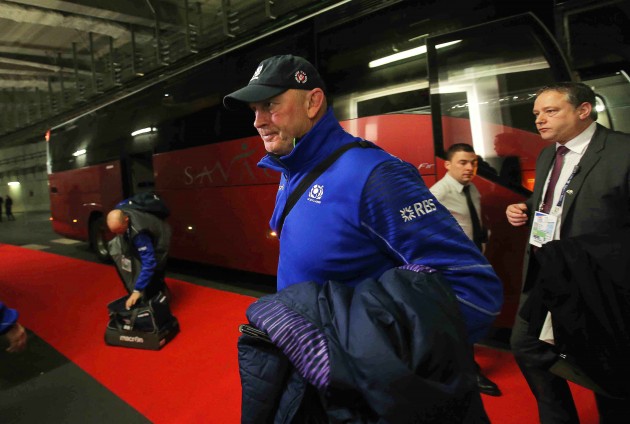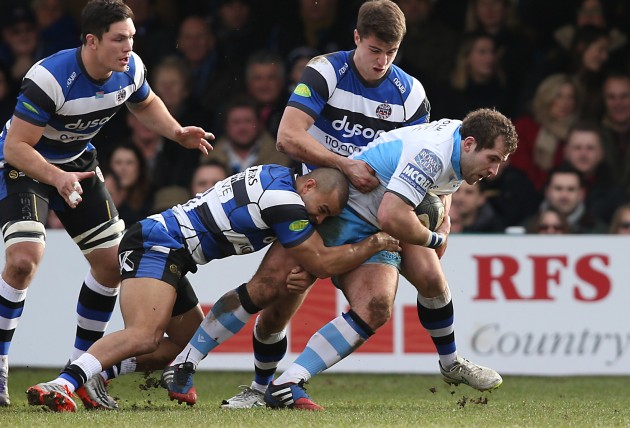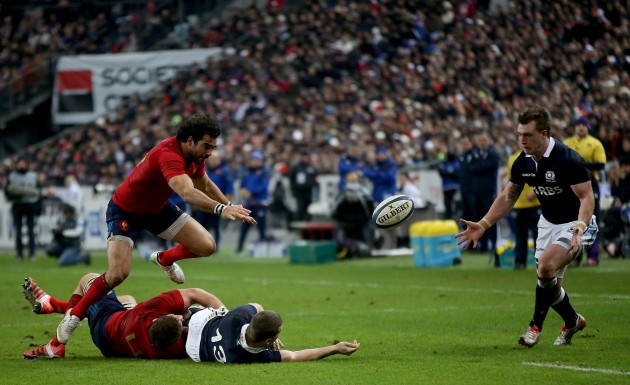As Murrayfield prepares to welcome the Welsh, Scotland great Colin Deans argues for an infusion of young blood up front
If Scotland’s front row needed any extra motivation for Sunday’s RBS 6 Nations match against Wales, they needn’t look far to find it. For Colin Deans, Scotland’s 1984 Grand Slam hooker, believes experienced trio Alasdair Dickinson, Ross Ford and Euan Murray – who sits out this weekend’s match because of his religious beliefs – are failing to meet the demands of modern Test rugby and need to be discarded.
Deans saves his bluntest criticism for former Scotland captain Ford, who plays in the No 2 shirt that Deans wore with distinction for his country 52 times from 1978-87.
“Ross should be giving a lot more than he is for someone with 80 caps. He has been found wanting, and I think he gave away a couple of penalties against France. A player of his size and experience should be leading more and handling more than he is,” says Deans, who runs his own company, Profoil, in England’s East Midlands.
“A modern-day hooker needs to be very mobile and carry well and make big hits, and he isn’t giving enough energy to the team. He’s not explosive enough. There are a lot of good young hookers about, such as Fraser Brown and Pat MacArthur, and we need to blood them.”
Ford’s lineout stats have impressed during the reign of new head coach Vern Cotter, but Deans says: “With the two Gray brothers being the towers they are, I could probably hit them. The lineout is a huge strength and (replacement) Jim Hamilton doesn’t weaken the side. He’s been all round the world and is a great asset.”
Deans believes Ford should have been converted to a prop forward three or four years ago, and argues that the SRU’s director of rugby Scott Johnson must look at opportunities to train players for different positions in order to get the best men on the park. At nearly 31, it’s too late for Ford to switch now and Deans also favours sidelining two other older heads in Murray, 34, and Dickinson, 31. The three share 184 caps worth of experience.
“Euan is not the player he used to be, and Alasdair used to be more dynamic – international rugby is just a bit beyond him. They’ve been great servants but they’re both stopgaps, players who don’t offer enough in the latter part of their careers. The front row is a bit of a concern.”
Young man’s sport
Deans, whose son Roddy coaches Scotland U16, is certainly a champion of youth. And in his view previous Scotland regimes have been reluctant to give younger players a chance to express themselves. It took an injury to give then teenager Stuart Hogg his Test debut three years ago and there are other examples of young talent flourishing in the current team.
“You need to blood youngsters – the ones who went on tour last summer all did well. Rugby is a young man’s sport, although Paul O’Connell might differ. You don’t know how well a player can play until he has to play.
“Finn Russell was a nobody two years ago but he got his opportunity through injuries and he had a fantastic game against France. Mark Bennett had to go to France (joining Clermont) to get a game – and he’s been a revelation. These players will only get better.”
Memories to treasure
Deans can speak from experience because in 1986 he captained a Scotland side in Wales that included relative ‘unknowns’ in the Hastings brothers, Finlay Calder, John Jeffrey and David Sole. All five went on to become British & Irish Lions. The Scots played some great rugby in Cardiff that day but went down 22-15 in a match famous for Paul Thorburn’s monster 64-metre penalty.
Indeed, the Scotland-Wales fixture has thrown up all manner of iconic moments, such as Gerald Davies’s try and John Taylor’s touchline conversion in 1971, Gareth Edwards’s try in the mud in 1972, and Phil Bennett’s classic try in 1977 (see video below).
Mercifully, there was no TMO in those days because the latter try (not to mention Edwards’s ‘greatest-ever’ try for the Barbarians) might have been chalked off for a forward pass. At the very least, there would have been an interminable wait before the try was awarded, killing the moment.
More recently, we’ve seen the great scores by Jonathan Davies and Ieuan Evans, and John Leslie’s ten-second try to spoil Graham Henry’s Six Nations debut, and Deans can add plenty of other memories to the list.
“My first away International was in Wales and they had Gareth Edwards, Phil Bennett, JPR, JJ, Fenwick, the Pontypool front row – all legends. It was a baptism of fire and I was overawed in many ways but we didn’t do badly.
“After Graham Hogg came on as a replacement, there were seven Hawick lads on the field and that shows how good Hawick were at that time. Cranston and Renwick were a fantastic centre partnership, Brian Hegarty was a great seven, Alan Tomes won 40-odd caps, Norman Pender was a man-mountain of a prop. Hawick were on the crest of a wave and here we were playing against the greats of Welsh rugby.
“I weighed 12 and a quarter stone and the press used to call me ‘slight but swift Deans’. In modern rugby I wouldn’t have been able to contemplate playing at that weight. But Ian McLauchlan was very experienced, Norman was a man-mountain and we had the run that day.” Wales won 22-14 on their way to a Grand Slam.
The memories come thick and fast for Deans. “In 1981 I had my first win with Scotland, because I don’t count the France win in 1980 as I came off with a rib injury. Then in 1982 we beat them in Cardiff (34-18). We scored one of the great tries when (Wales’) Gareth Davies chipped and Roger (Baird) took it in his 22 and skipped around two Welshmen and passed to Iain Paxton, who passed to Alan Tomes. I was inside Alan and as a Hawick man I expected the pass, but he gave it to Jim Calder outside him. I’ll never forgive him!
“We ripped them apart that day, and it was the start of Wales’ decline and our incline. In 1984 we had the Jim Aitken one-yard try at the start of our Grand Slam year. Wales-Scotland games have always had something happening.”
Exploiting North’s absence
Fast-forward three decades and Deans likes what he sees from Cotter’s Scotland, notwithstanding the front-row selection issue. He would also play wing Dougie Fife ahead of Tim Visser when everyone is available.
“I’ve been pleasantly surprised. Vern Cotter is a new voice and an excellent coach, as his track record shows. He’s picking players who are playing well, not picking on reputation. He’s brought in a load of youngsters and I like his approach. From a line breaks point of view and an entertainment point of view we deserved to beat France.
“It was pleasing to hear that George North won’t be playing for Wales this weekend because as a Northampton Saints fan I’m a great fan of his. He makes ground and draws players out of position and his absence will be beneficial to us. We can probably attack Liam Williams more than we would have attacked George.
“People have sussed what Wales are about and England made them look pretty ordinary. It’s our first home game and we should be full of confidence. We’ve got the personnel, especially from nine outwards. It’s the first time in a long time that we’ve had attacking players from nine to 15. So I’m quietly confident we will beat Wales, as long as we can get a good start.”








